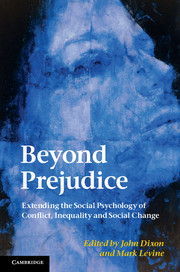Book contents
- Frontmatter
- Contents
- Figures
- Tables
- Contributors
- Acknowledgements
- Introduction
- Part I Beyond prejudice
- 1 From perception to mobilization: the shifting paradigm of prejudice
- 2 Prejudice, social identity and social change: resolving the Allportian problematic
- 3 An ambivalent alliance: hostile and benevolent sexism as complementary justifications for gender inequality
- 4 Prejudice and dehumanization
- 5 Stereotyping, prejudice and discrimination revisited
- 6 Beyond ‘old’ and ‘new’: for a social psychology of racism
- 7 The notion of ‘prejudice’: some rhetorical and ideological aspects
- 8 The prejudice problematic
- 9 Implicit prejudice in mind and interaction
- 10 Rethinking the prejudice problematic: a collaborative cognition approach
- Part II Prejudice and social change revisited
- Index
- References
6 - Beyond ‘old’ and ‘new’: for a social psychology of racism
from Part I - Beyond prejudice
Published online by Cambridge University Press: 05 June 2012
- Frontmatter
- Contents
- Figures
- Tables
- Contributors
- Acknowledgements
- Introduction
- Part I Beyond prejudice
- 1 From perception to mobilization: the shifting paradigm of prejudice
- 2 Prejudice, social identity and social change: resolving the Allportian problematic
- 3 An ambivalent alliance: hostile and benevolent sexism as complementary justifications for gender inequality
- 4 Prejudice and dehumanization
- 5 Stereotyping, prejudice and discrimination revisited
- 6 Beyond ‘old’ and ‘new’: for a social psychology of racism
- 7 The notion of ‘prejudice’: some rhetorical and ideological aspects
- 8 The prejudice problematic
- 9 Implicit prejudice in mind and interaction
- 10 Rethinking the prejudice problematic: a collaborative cognition approach
- Part II Prejudice and social change revisited
- Index
- References
Summary
In 1950, the United Nations Educational, Scientific and Cultural Organization (UNESCO) issued a paper entitled The Race Concept that had been drafted by a group of prominent biological and social scientists (reproduced in UNESCO, 1952). The statement used the term ‘racism’ – then a relatively new term – to refer to a faulty and illegitimate science of human categories. It denounced racism in terms of two related elements: scientifically, it was seen to rest on beliefs about the attributes of social groups that were unsubstantiated by available evidence; morally, it debased human dignity by relating to people in terms of their ascribed ‘race’, rather than simply as human beings. It was therefore an aberration from the liberal project based on a false pseudoscience of ‘race’. The Race Question set the agenda for an anti-racist programme consisting of undermining the scientific validity of the notion of ‘race’ and combating ignorance about such matters through education. This agenda became known as the UNESCO tradition, and has gone on to form the basis for most top-down forms of anti-racism (Lentin, 2005).
In a similar vein, a statement had been issued in 1938 by the American Psychological Association (APA; reproduced in Benedict, 1942/1983), repudiating theories of genetic inequality of races. The APA statement suggests an ‘emotional’, rather than factual, basis for such theories. This, along with the publication of The Authoritarian Personality (Adorno et al., 1950) and The Nature of Prejudice (Allport, 1954), marks a shift in focus within psychology away from the study of racial differences towards the question of why beliefs in such differences arise and persist despite being false (Billig, 1985; Duckitt, 1992; Pettigrew, 2007; Reicher, 2007; Reicher and Hopkins, 2001).
- Type
- Chapter
- Information
- Beyond PrejudiceExtending the Social Psychology of Conflict, Inequality and Social Change, pp. 120 - 138Publisher: Cambridge University PressPrint publication year: 2012
References
- 3
- Cited by



